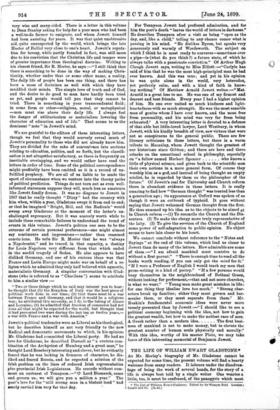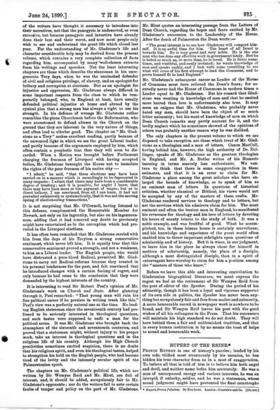THE LIFE OF WILLIAM EWART GLA.DSTONE.* As Mr. Morley's biography
of Mr. Gladstone cannot be expected for some time, the present volume will find a hearty welcome from many readers. It labours under the disadvan- tage of being the work of several hands, for the story of a life is always best told by a single writer. One wearies a little, too, it must be confessed, of the panegyric which most
a The Life of William React Gladstone. Edited by Sir Wemyss Reid. London: Cassell and Co. [7s. 6d.) of the writers have thought it necessary to introduce into their narratives, not that the panegyric is undeserved, or even excessive, but because panegyric and invective have already done their best and their worst, and now most people only wish to see and understand the great life which closed last
year. For the understanding of Mr. Gladstone's life and character considerable help may be derived from the present volume, which contains a very complete collection of facts regarding him, accompanied by many "well-chosen extracts from his writings and speeches. Not the least interesting chapters are those which describe the statesman in his unre- generate Tory days, when be was the unabashed defender of civil and religious privilege, of slavery, and an apologist for bribery and corruption at elections. But as an apologist for injustice and oppression, Mr. Gladstone always differed in some important respects from the class to which he tem- porarily belonged, who, in England at least, have usually defended political injustice at home and abroad by the cynical plea that a strong man has always a right to use his strength. In his defence of wrongs Mr. Gladstone rather resembles the pious Churchmen before the Reformation, who were accustomed to defend abuses in the Church on the ground that they are inherent in the very nature of things, and often lead to ulterior good. The chapter on " Mr. Glad- stone as a Tory" makes excellent reading, partly because of the unwonted light in which we see the great Liberal leader, and partly because of the arguments employed by him, which often contain a prophetic hint that they will soon be dis- carded. When a Motion was brought before Parliament charging the freeman of Liverpool with having accepted bribes, Mr. Gladstone besought the House not to immolate the rights of the poor freemen of his native city .—
" I admit," he said, "that these elections may have been carried on in a manner which is exceedingly to loe deprecated in many respects : I admit that there may have b'ien a considerable degree of treating ; and it is possible, for aught I know, that there may have been more or less payment of wages ; but as to direct bribery, I am convinced, from all I can learn, it had not prevailed extensively or systematically, that it was not the moving spring of electioneering transactions."
It is not surprising that Mr. O'Connell, having listened to this defence, complimented the Honourable Member for Newark, not only on his ingenuity, but also on his ingenuous- ness, adding that it had removed any doubt he previously might have entertained as to the corruption which had pre- vailed in the Liverpool elections.
It has often been remarked that Mr. Gladstone carried with him from the days of his Toryism a strong conservative sentiment, which never left him. It is equally true that this conservative sentiment proved a strength, and not a weakness, to him as a Liberal leader. The English people, who would have distrusted a pure-blood Radical, permitted Mr. Glad- stone to carry out Radical reforms because they trusted in his personal tenderness for the past, and felt convinced that he introduced changes with a certain feeling of regret, and only because he had come to the conclusion that they were demanded by the highest interests of the country.
It is interesting to read Sir Robert Peel's opinion of Mr. Gladstone's work on Clatrelt and State. After glancing through it, Peel remarked: " That young man will ruin his fine political career if he persists in writing trash like this." Peel's view was a perfectly natural one at the time. No lead- ing English statesman since the seventeenth century had pro- fessed to be seriously interested in theological questions, and such tastes were supposed to unfit a man for the political arena. It was Mr. Gladstone who brought back the atmosphere of the sixteenth and seventeenth centuries, and proved that a statesman might, without injury to his proper work, take an interest in theological questions and in the religious life of his country. Although his High Church proclivities sometimes excited suspicion, there is no doubt that his religious spirit, and even his theological tastes, helped to strengthen his hold on the English people, who had become tired of the levity and the intensely secular spirit of the Palmerstonian epoch.
The chapters on Mr. Gladstone's political life, which are written by Sir Wemyss Reid and Mr. Hirst, are fall of interest, and, it should be added, scrupulously fair to Mr.
Gladstone's opponents ; nor do the writers fail to note certain faults of temper and policy on the part of Mr. Gladstone. Mr. Hirst quotes an interesting passage from the Letters of Dean Church, regarding the hopes and fears excited by Mr.
Gladstone's succession to the Leadership of the House. After the death of Palmerston the Dean wrote :-
" The great interest is to see how Gladstone will comport him- self. It is an awful time for him. The heart of all Israel is towards him.' He is very great and very noble. He is the one man who has done any effective work in government lately. But he is hated as much as, or more than, he is loved. He is fierce some- times, and wrathful, and easily irritated ; he wants knowledge of men and speaks rashly, and I look with some trembling to see what will come of his first attempt to lead the Commons, and to prove himself fit to lead England."
Mr. Gladstone's subsequent career as Leader of the House of Commons must have relieved the Dean's fears; for as- suredly never had the House of Commons in modern tames a Leader equal to Mr. Gladstone. But his remark that Glad- stone was wanting in knowledge of men and that he excited more hatred than love is unfortunately also true. It may seem an enigma that Mr. Gladstone, who probably never hated any man, should have been the object of no much bitter animosity ; but his want of knowledge of men on which Dean Church remarks may partly account for it, and the lordly neglect which he sometimes showed of the opinions of others was probably another reason why he was disliked.
The only chapters in the present volume to which we are disposed to take exception are those which treat of Mr. Glad- stone as a theologian and a man of letters. Canon MacColl, having behind him, however, the high authority of Dr. ail- linger, speaks of Mr. Gladstone as the greatest theologian in England, and Mr. A. Butler writes of his Homeric learning in terms scarcely less enthusiastic. We ven-
ture to think that there is some exaggeration in these estimates, and that it is an error to claim for Mr.
Gladstone a place among the great scholars who have en- larged the bounds of knowledge, or to speak of him as an eminent man of letters. In questions of historical criticism, whether classical or Biblical, his views would not be accepted by any of the masters of these crafts. Mr.
Gladstone rendered services to theology and to letters, but not the services which his admirers claim for him. The most eminent and often the busiest man in England, he manifested his reverence for theology and his love of letters by devoting his hours of scanty leisure to the study of both. It was a noble example, and was fruitful of good. What he accom- plished, too, in those leisure hours is certainly marvellous; and his knowledge and experience of the great world often enabled him to throw important sidelights upon questions of
scholarship and of history. But it is wiser, in our judgment, to leave him in the place he always chose for himself in matters of scholarship, namely, the place of a disciple, although a most distinguished disciple, than in a spirit of
extravagant hero-worship to claim for him a position among the "masters of those who know."
Before we leave this able and interesting contribution to Gladstonian biographical literature, we must express the regret we feel at the retirement of Sir Wemyss Reid from the post of editor of the Speaker. During the period of his editorship, though it has been a loyal and vigorous supporter of its own side in politics, the Speaker has never been any- thing but scrupulously fair and free from malice and animosity. A more honourable record in newspaper work is nowhere to be found, and Sir Wemyss Reid leaves his post with the good wishes of all his colleagues in the Press. That his successors will maintain his high standard we do not doubt. They will have behind them a fair and unblemished tradition, and that in every human institution is by no means the least of helps to sound and honourable work.



















































 Previous page
Previous page